Resin bathtub quality top 5 facts
Introduction
If you're wondering about resin bathtub quality, you're not alone. Many people find choosing the right bathtub material confusing and overwhelming.
This article will demystify resin bathtubs by examining five key question that set them apart.
We'll cover what resin bathtubs are, whether resin is a good material, the benefits of resin bathtubs, the best quality materials for bathtubs, and how stone resin compares to acrylic.
These insights will help you make an informed decision and solve any doubts you may have about choosing the best bathtub for your needs.
I can also recommend “Chinese modern freestanding bathtub companies”
What is a Resin Bathtub?
Resin bathtubs are bathtubs made from a composite material that combines resin with other elements, such as natural stone, minerals, or acrylic.
These bathtubs are renowned for their unique blend of beauty, functionality, and durability. Let's delve into some key characteristics that set resin bathtubs apart:
Durability:
Resin bathtubs are exceptionally durable, standing up well to scratches, stains, and impacts.
They are designed to endure the rigors of daily use without losing their charm.
Aesthetic Appeal:
With the ability to mimic the look of natural stone or other materials, resin bathtubs bring a touch of luxury and elegance to any bathroom.
They come in various colors and finishes to suit different décor styles.
Heat Retention:
One of the standout features of resin is its thermal properties. Resin bathtubs retain heat longer than traditional materials, ensuring a warmer, more enjoyable bathing experience.
Lightweight:
Compared to natural stone options, resin bathtubs are significantly lighter. This makes them easier to install and handle, reducing labor costs and complexity.
Smooth Surface:
The smooth, non-porous surface of resin bathtubs makes cleaning and maintenance a breeze. Additionally, the non-porous nature helps prevent the growth of mold and mildew.
Customizable:
Resin can be molded into various shapes and sizes, offering a high degree of customization. This flexibility allows for tailored designs to fit specific preferences and bathroom configurations.
Eco-friendly Options:
Some resin bathtubs are crafted using eco-friendly materials and processes, catering to environmentally conscious consumers looking for sustainable bathroom solutions.
In summary, resin bathtubs offer a compelling combination of durability, aesthetic appeal, and practical benefits, making them a favored choice for modern bathrooms.
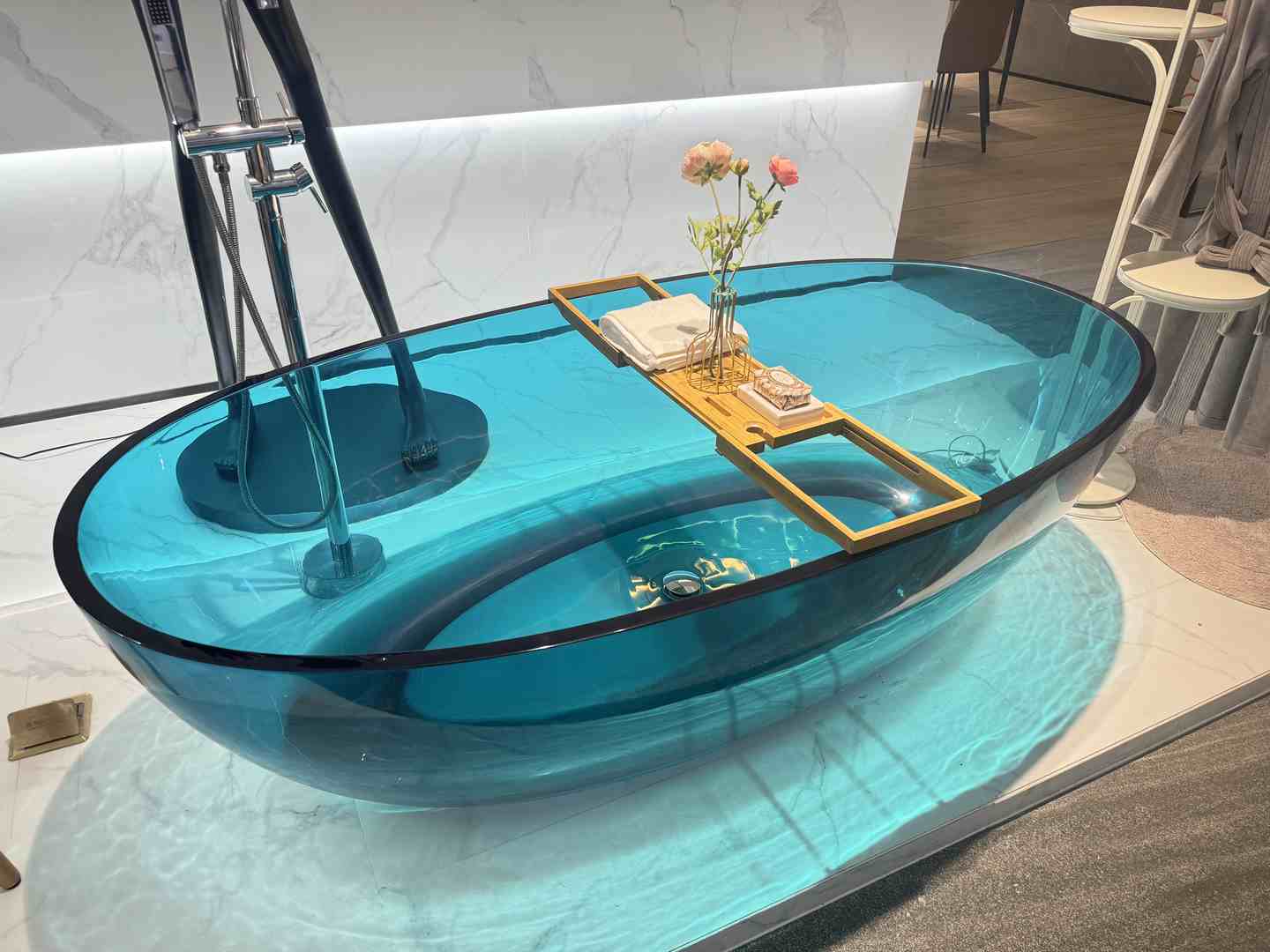
Is Resin a Good Material for a Bathtub?
Yes, resin is widely regarded as an excellent material for bathtubs for several compelling reasons:
Durability:
Resin is renowned for its durability and resistance to cracks, scratches, and impacts.
This robustness ensures that the bathtub maintains its pristine appearance and functionality over the years, even with regular use.
Aesthetic Versatility:
Resin bathtubs can emulate the appearance of natural materials such as stone or marble, offering a luxurious aesthetic without the associated high costs and maintenance demands.
Available in a variety of colors and finishes, resin bathtubs can seamlessly complement diverse bathroom styles.
Heat Retention:
The thermal properties of resin are outstanding, allowing bathtubs made from this material to retain heat for extended periods.
This translates to a more comfortable and enjoyable bathing experience, as the water remains warm longer.
Lightweight:
Compared to natural stone or cast iron, resin is significantly lighter.
This lighter weight facilitates easier transportation, handling, and installation, making resin bathtubs particularly advantageous in situations where weight is a concern.
Smooth and Non-porous Surface:
The surface of resin bathtubs is smooth and non-porous, which simplifies cleaning and maintenance.
Additionally, this non-porous quality helps prevent the growth of mold and mildew, enhancing hygiene.
Customization:
Resin can be molded into a wide array of shapes and sizes, providing substantial design flexibility.
This allows for the creation of unique and customized bathtub designs tailored to specific bathroom layouts and personal preferences.
Eco-friendly Options:
Some resin bathtubs are manufactured using eco-friendly materials and processes, making them a more sustainable choice for environmentally conscious consumers.
Cost-Effective:
Resin bathtubs offer the look and feel of high-end materials at a more affordable price.
This cost-effectiveness makes them an attractive option for homeowners seeking a luxurious yet budget-friendly bathing solution.
In summary, resin bathtubs combine durability, aesthetic appeal, excellent heat retention, and easy maintenance, making them a superb choice for modern bathrooms.
Their versatility and cost-effectiveness further enhance their appeal, solidifying resin as a top material for bathtubs.
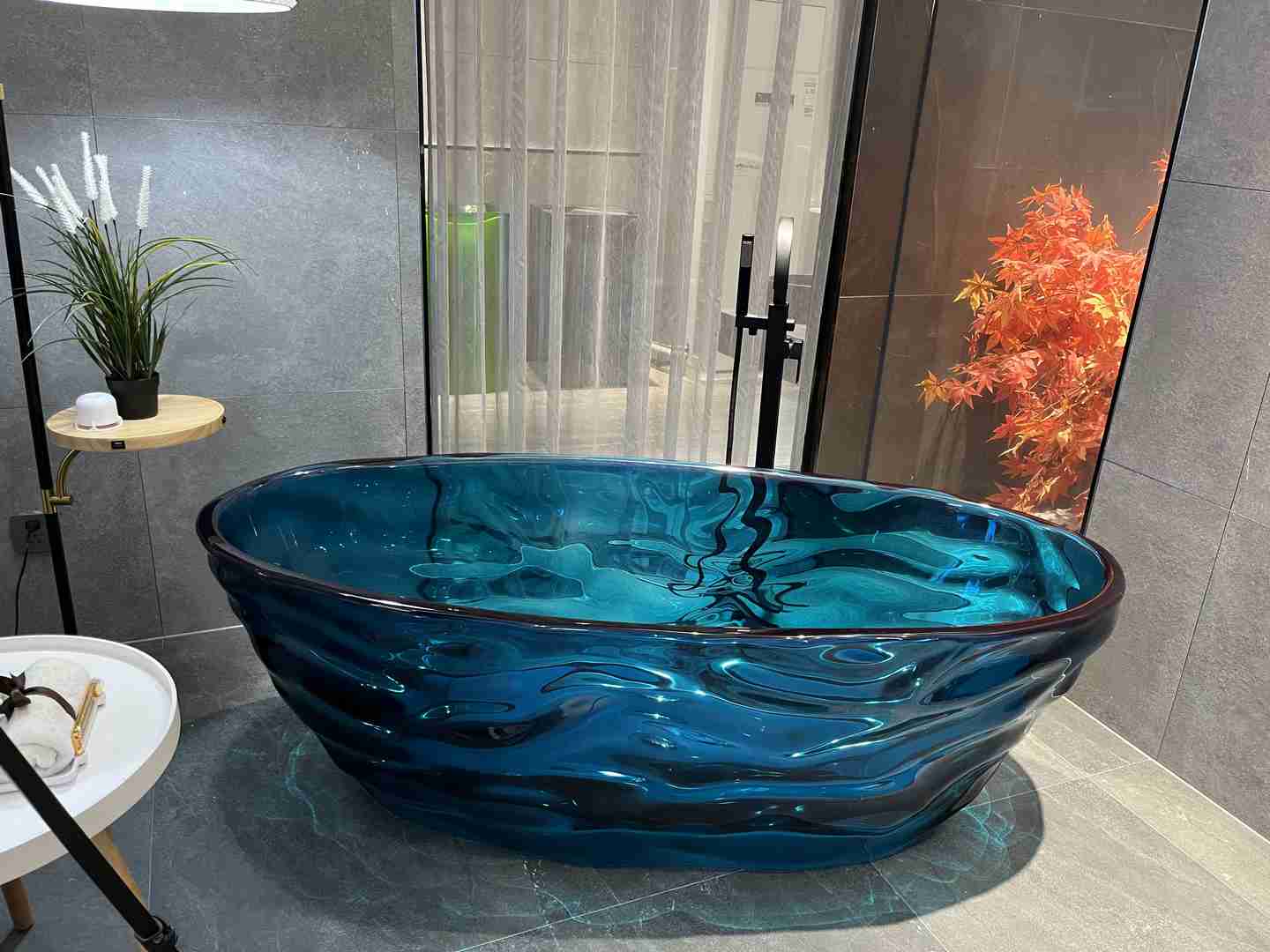
What are the Benefits of a Resin Bathtub?
Resin bathtubs offer numerous benefits, making them a popular choice for modern bathrooms. Here are the key advantages:
Durability:
Resin bathtubs are highly resistant to scratches, chips, and cracks, ensuring long-lasting performance. This durability helps maintain their appearance and functionality over time, even with regular use.
Aesthetic Appeal:
Resin can be molded to replicate natural materials like stone or marble, delivering a luxurious and elegant look.
Available in a variety of colors and finishes, these bathtubs offer design flexibility to complement different bathroom styles.
Heat Retention:
The thermal properties of resin are exceptional, allowing the bathtub to retain heat longer than traditional materials.
This provides a warmer and more comfortable bathing experience, enhancing overall user satisfaction.
Smooth and Non-porous Surface:
The non-porous surface of resin bathtubs makes them easy to clean and maintain.
This also prevents the growth of mold and mildew, promoting better hygiene and a healthier bathroom environment.
Customization:
Resin's versatility allows it to be molded into various shapes and sizes, offering greater design flexibility.
This enables the creation of unique and customized bathtub shapes to fit specific bathroom layouts and personal preferences.
Eco-friendly Options:
Some resin bathtubs are made using eco-friendly materials and manufacturing processes, providing a more sustainable choice for environmentally conscious consumers.
This makes them an attractive option for those looking to reduce their environmental footprint.
Repairability:
In the event of damage, resin bathtubs are often easier to repair compared to other materials.
Minor scratches and chips can typically be buffed out or filled in, restoring the bathtub's original appearance with minimal effort.
Variety of Finishes:
Resin bathtubs come in glossy, matte, or textured finishes, allowing homeowners to select a surface that suits their personal style and bathroom décor.
This variety ensures that resin bathtubs can meet diverse aesthetic preferences and design needs.
In conclusion, the combination of durability, aesthetic appeal, excellent heat retention, and easy maintenance makes resin bathtubs an ideal choice for modern bathrooms.
Their customization options, eco-friendly production, and ease of repair further enhance their attractiveness, offering a versatile and sustainable solution for homeowners.
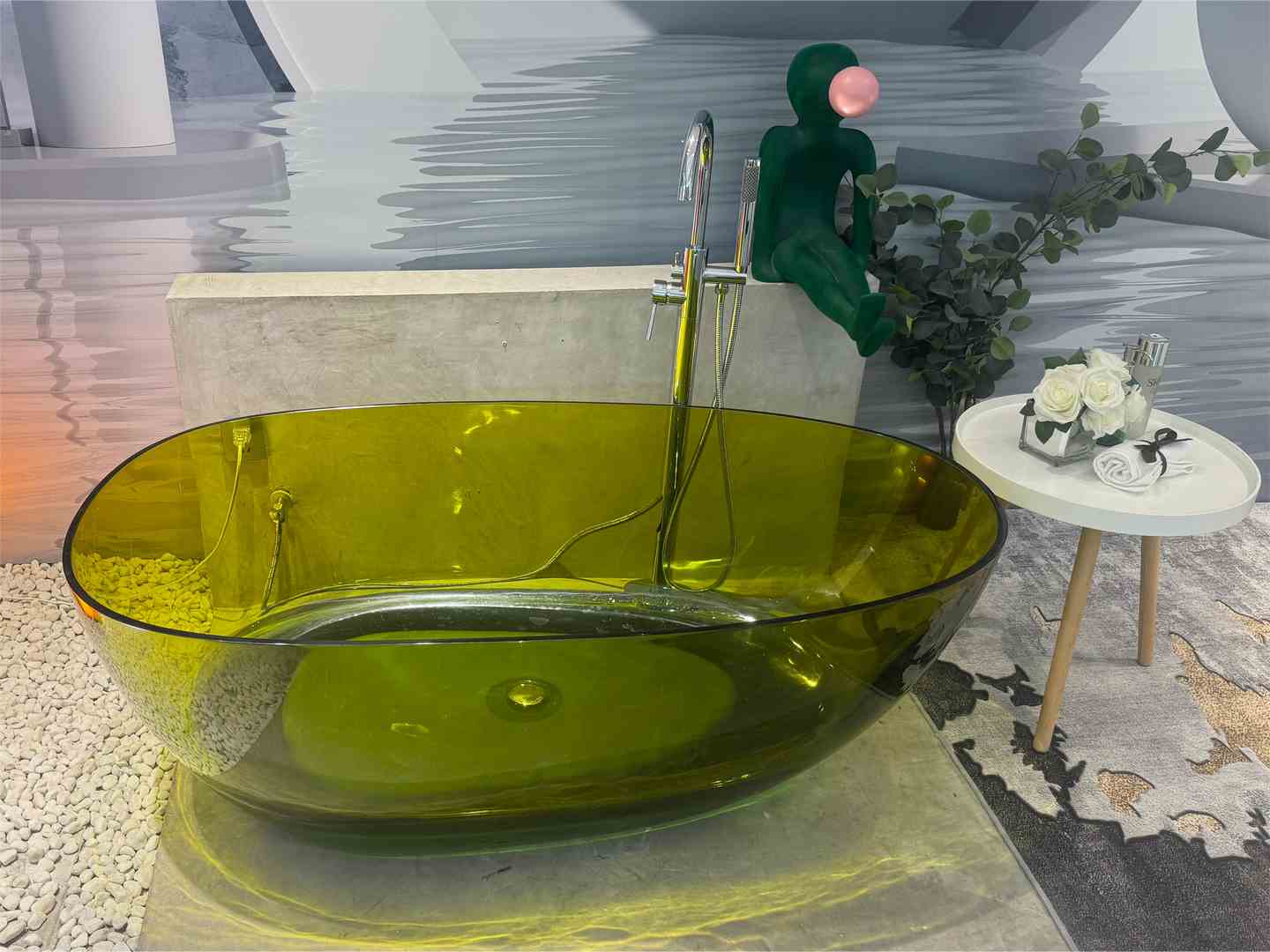
What is the Best Quality Bathtub Material?
The best quality bathtub material varies depending on individual preferences, budget, and specific needs.You can also refer to another article “Bathroom design with bathtub”.
Here are some of the most highly regarded materials for bathtubs, each with its own advantages and drawbacks:
Acrylic:
Benefits:
Acrylic bathtubs are lightweight, affordable, and easy to install. They retain heat well, making for a warmer bathing experience, and come in a wide variety of shapes and colors.
Drawbacks:
Acrylic can scratch more easily than other materials, though scratches can often be buffed out, restoring the bathtub's appearance.
Cast Iron:
Benefits:
Known for extreme durability, cast iron bathtubs have excellent heat retention and a classic appearance. They are highly resistant to scratches and chipping.
Drawbacks:
Cast iron bathtubs are very heavy, making installation more challenging, and they are usually more expensive than acrylic or fiberglass options.
Enameled Steel:
Benefits:
Enameled steel bathtubs are durable, less expensive than cast iron, and resistant to chemicals and stains.
Drawbacks:
Over time, they can chip and rust, and they do not retain heat as well as cast iron bathtubs.
Resin/Stone Resin:
Benefits:
Resin bathtubs are durable and can mimic the look of natural stone.
They have excellent heat retention and are available in various colors and finishes.
Drawbacks:
Resin bathtubs can be expensive, and the quality can vary depending on the manufacturer.
Solid Surface:
Benefits:
Solid surface bathtubs are seamless, non-porous, easy to clean, and available in various colors and shapes.
They offer a high-end look similar to natural stone.
Drawbacks:
These bathtubs are expensive and heavy, often requiring professional installation.
Copper:
Benefits:
Copper bathtubs have a unique aesthetic appeal, excellent heat retention, and natural antibacterial properties.
Over time, they develop a beautiful patina.
Drawbacks:
Copper bathtubs are very expensive, heavy, and require regular maintenance to preserve their appearance.
Wood:
Benefits:
Wood bathtubs provide a unique, natural, and warm appearance with excellent heat retention.
They can be a stunning focal point in a bathroom.
Drawbacks:
Wood bathtubs require high maintenance, including regular sealing and care to prevent water damage and warping.
Fiberglass:
Benefits:
Fiberglass bathtubs are lightweight, affordable, easy to install, and easy to repair.
Drawbacks:
They are less durable than acrylic and prone to scratching and fading over time.
Ceramic Tile:
Benefits:
Ceramic tile bathtubs are customizable and can create a unique look. They are relatively inexpensive.
Drawbacks:
They require regular grout maintenance and can be uncomfortable to lie on due to the seams between tiles.
In conclusion, each bathtub material has its own set of pros and cons.
The best choice depends on what aspects are most important to you, such as durability, maintenance, appearance, and cost.
Understanding these characteristics can help you make an informed decision that best suits your bathroom needs.
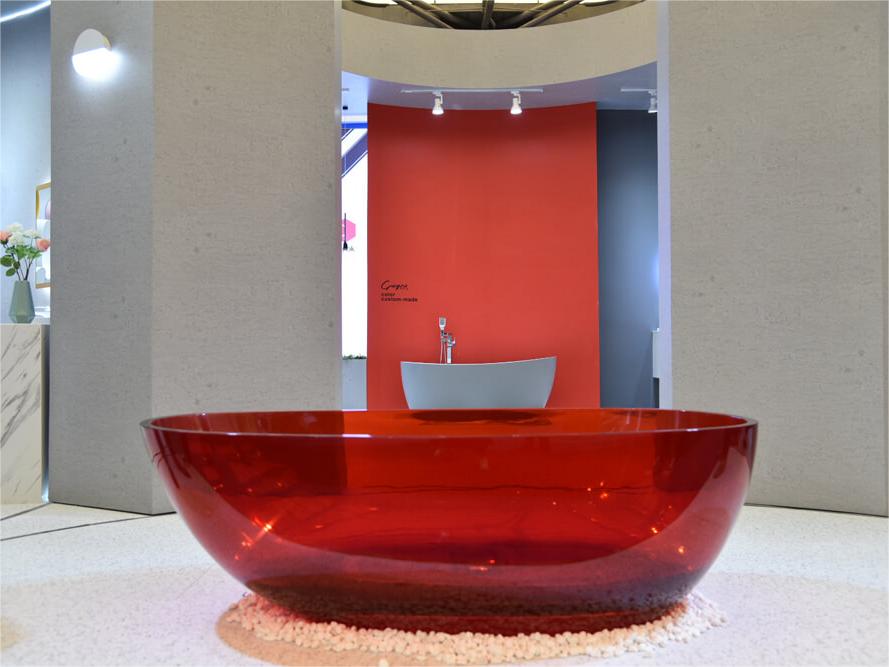
Is a Stone Resin Bathtub Better Than Acrylic?
Both stone resin and acrylic bathtubs have their own sets of advantages and considerations, making one better than the other depending on individual preferences and specific needs.
Here’s a detailed comparison to help determine which might be better for you:
Stone Resin Bathtubs
Advantages:
Durability:
Stone resin bathtubs are highly durable and resistant to scratches, chips, and stains, ensuring long-lasting use.
Aesthetic Appeal:
They offer a luxurious, high-end appearance, often mimicking the look of natural stone, which can elevate the style of any bathroom.
Heat Retention:
Stone resin has excellent thermal properties, keeping bathwater warmer for longer periods, enhancing the bathing experience.
Solid Feel:
These bathtubs provide a substantial, solid feel that many find appealing and reassuring.
Non-porous Surface:
The smooth, non-porous surface is easy to clean and maintain, and it resists mold and mildew, contributing to better hygiene.
Customizability:
Stone resin can be molded into various shapes and sizes, offering significant design flexibility to fit specific bathroom layouts and aesthetic preferences.
Disadvantages:
Weight:
Stone resin bathtubs are heavier than acrylic ones, which can complicate installation and may require additional floor support to handle the weight.
Cost:
Generally, stone resin bathtubs are more expensive than acrylic alternatives, reflecting their high-end material and design.
Repair:
If damaged, stone resin can be more challenging to repair compared to acrylic, potentially requiring professional assistance.
Acrylic Bathtubs
Advantages:
Lightweight:
Acrylic bathtubs are easier to handle and install, often without needing additional structural support, making them a convenient option.
Cost-effective:
They are typically more affordable than stone resin bathtubs, making them a popular choice for budget-conscious consumers.
Heat Retention:
Acrylic bathtubs retain heat relatively well, providing a warm and comfortable bathing experience.
Versatility:
Available in a wide variety of shapes, sizes, and colors, acrylic bathtubs offer extensive design options to suit various bathroom styles.
Ease of Repair:
Scratches and minor damages to acrylic bathtubs can often be easily repaired with a simple buffing or a repair kit, maintaining their appearance and functionality.
Disadvantages:
Durability:
While durable, acrylic is more prone to scratches and may not be as long-lasting as stone resin. It can also be susceptible to cracking under significant impact.
Appearance:
Acrylic bathtubs may not have the same high-end, luxurious look as stone resin, which could be a drawback for those seeking a more premium appearance.
Maintenance:
Acrylic can be susceptible to staining and discoloration over time if not properly maintained, which may require more diligent cleaning routines.
Summary:
Choose Stone Resin if you prioritize durability, a high-end aesthetic, excellent heat retention, and a solid feel.
Be prepared for a higher cost and potentially more complex installation.
Choose Acrylic if you prefer a lightweight, cost-effective option that offers versatility in design, ease of installation, and repair, while still providing good heat retention and durability for everyday use.
Ultimately, the decision depends on your specific needs, budget, and design preferences for your bathroom.
Each material has its own strengths and can provide a satisfying bathing experience when chosen to align with your priorities.
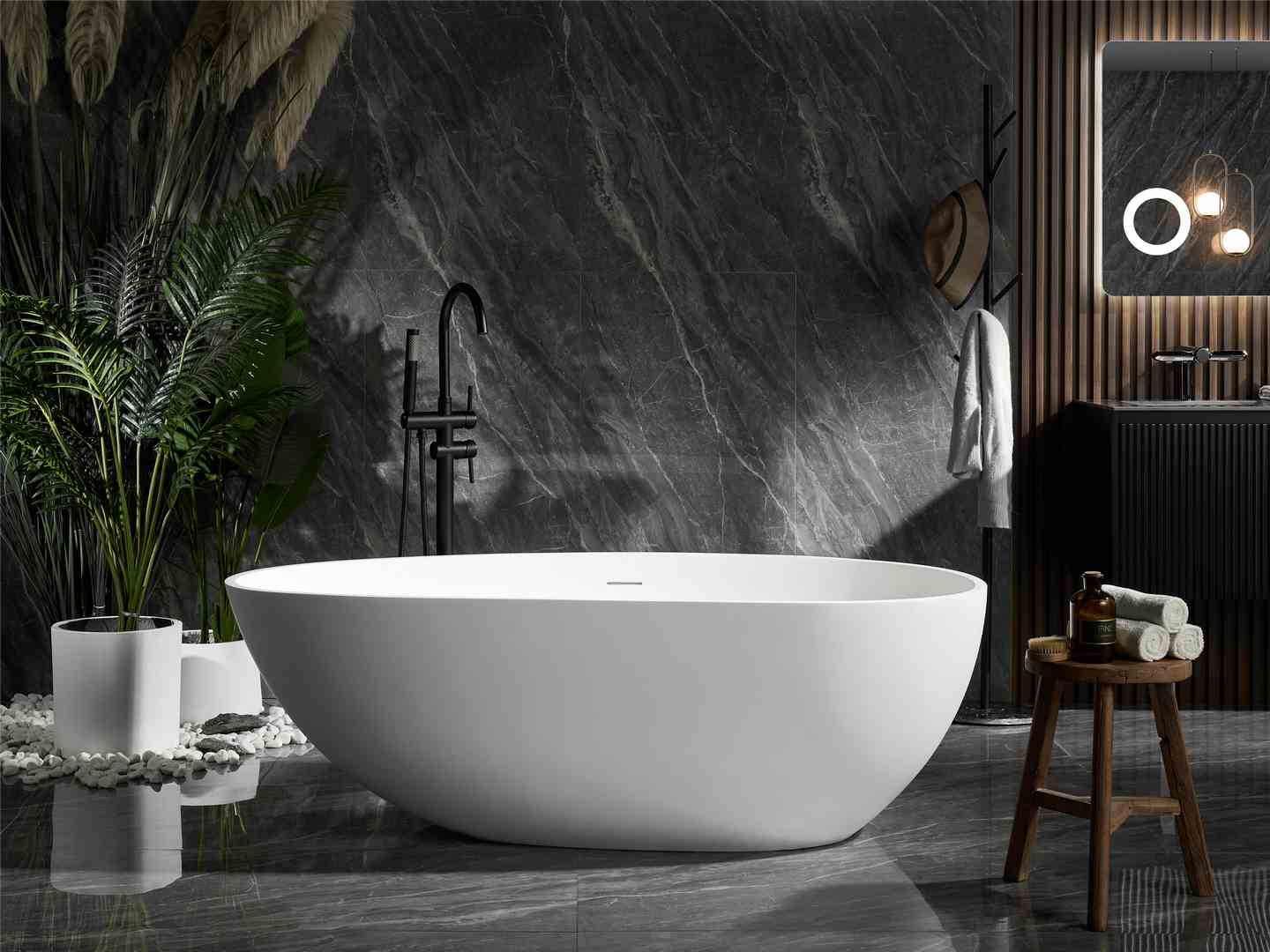
Conclusion
This article explored five key aspects of resin bathtub quality:
what a resin bathtub is, whether resin is a good material for bathtubs, the benefits of resin bathtubs, the best quality bathtub material, and a comparison between stone resin and acrylic bathtubs.
Among these, the durability and aesthetic appeal of resin bathtubs stood out as particularly popular qualities, driving higher purchase rates due to their long-lasting performance and luxurious appearance.
The excellent heat retention and smooth, non-porous surface also contributed to their popularity, offering enhanced comfort and hygiene.
Customizability was noted for its flexibility in design, making it a unique but less common preference.
Overall, resin bathtubs provide a compelling blend of beauty, functionality, and durability, making them a favored choice in modern bathroom design.
Welcome to know more detailed information about products in Cpingao:
